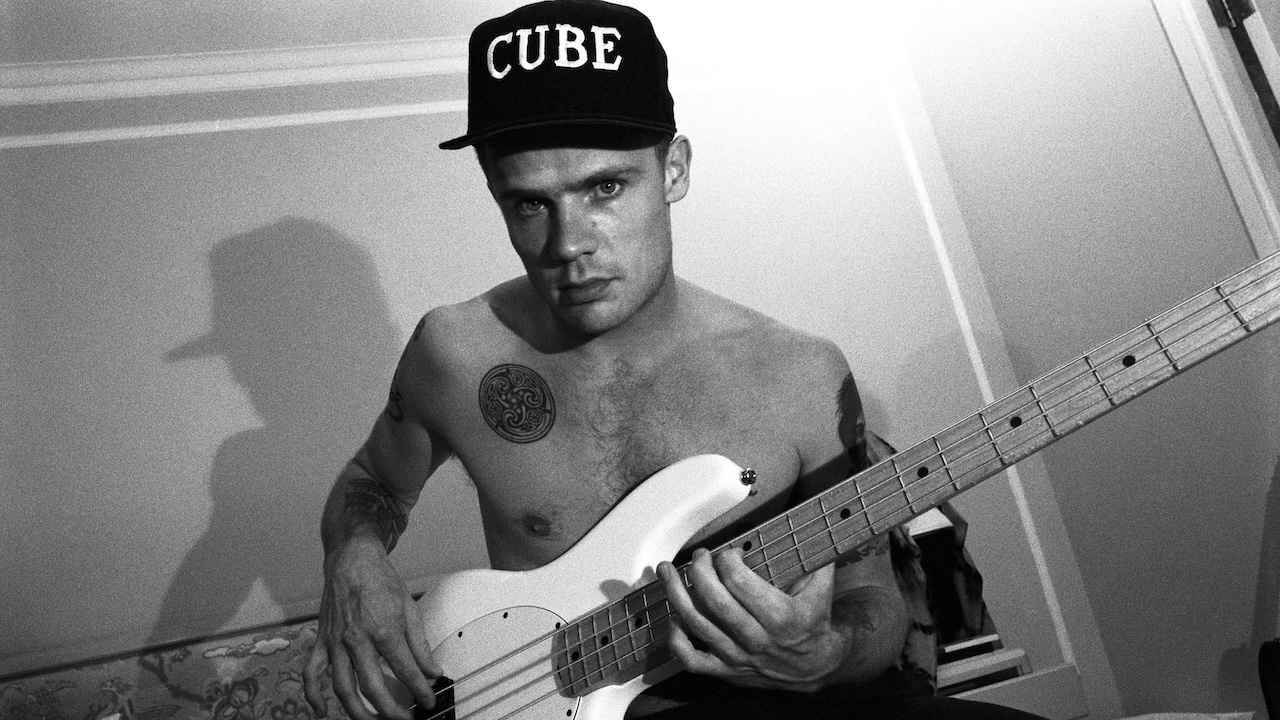“I told the guys, ‘Aah, it's just another bassline – I don't really like it.’ But they said, ‘No, no, it's really good – we gotta do it!’” Flea wanted to ditch Give It Away before his Red Hot Chili Peppers bandmates stepped in
Rick Rubin persuaded Flea to tone down his original bassline on the Red Hot Chili Peppers’ 1991 hit single

The Australia-born, Hollywood-raised Michael 'Flea' Balzary, so nicknamed for his diminutive stature and onstage leaps, is, many bassists feel, one of the finest funk bass players ever to stalk the earth.
Bred on a diet of cool jazz and trumpet lessons, with his most treasured childhood memory a meeting with Dizzy Gillespie, Flea took up the bass guitar after the prompting of his high-school classmate Hillel Slovak, who – along with singer Anthony Kiedis and drummer Jack Irons – formed the first line-up of the Red Hot Chili Peppers, then a cheeky funk-punk act.
From these humble beginnings, Flea evolved a frighteningly fast slap-and-pop style, influenced by Larry Graham and Bootsy Collins, but spiced up with the energy of his beloved hardcore punk scene.
After applying scintillating bursts of notes to four ’80s albums, Flea had become known as ‘Joe Bass Player’ as he once put it, and decided to tone down for 1991's landmark Blood Sugar Sex Magik album.
Give It Away was a monster of a single, with a bassline that more or less made up the whole song with its liquid slide motif and some beautifully dexterous fills. As Flea told Bass Player in February 1992, the song almost ended up on the scrapheap. “I had told the guys, ‘Aah, it's just another bassline – I don't really like it.’ But they said, ‘No, no, it's really good – we gotta do it.’ Good thing!”
Producer Rick Rubin clashed with Flea during the recording of this track, attempting to persuade him to simplify his original bassline. But Give It Away became a total inspiration to bass players everywhere and went on to win Best Hard Rock Song at the 35th Grammy Awards in 1993.
At the beginning of the tune, Flea plays two neck-spanning slides. These are a little tricky to nail – the most important thing is to reach the uppermost notes right on beats three and four. It's a good idea to break out the metronome to make sure you're hitting these slides on the right part of the beat.
All the latest guitar news, interviews, lessons, reviews, deals and more, direct to your inbox!
To dig into the verse, Flea outlines an Am7 using chord tones, and makes the most of the long glissandos down from the G. Pay special attention to beat two, which includes two different slides: first from D up to E, and then from G at the 12th fret down the neck. While there are definite starting and ending points on the first slide, the downward slide tapers off without landing on a specific note.
The second bar is similar, except that the high G at the end of beat two hangs on for just a hair longer, carrying into beat three. The key for this funky line is in the details: the deadened ghost-notes and pickup notes Flea plays in beats one, three, and four help the line lock the groove.
For the chorus, begin with an open-A downbeat. Beat four is packed with two ghost-notes, which you should play by half-fretting G and C. Slide into the second bar's downbeat from G, holding the A until beat two, when you should begin your slide down the neck.
At the guitar solo, Flea drops down a string, beginning his line on a low E. After repeating the one-bar figure seven times, he rounds out the section with a rippin' descending line played on the E string, leading back into the verse figure.

Nick Wells was the Editor of Bass Guitar magazine from 2009 to 2011, before making strides into the world of Artist Relations with Sheldon Dingwall and Dingwall Guitars. He's also the producer of bass-centric documentaries, Walking the Changes and Beneath the Bassline, as well as Production Manager and Artist Liaison for ScottsBassLessons. In his free time, you'll find him jumping around his bedroom to Kool & The Gang while hammering the life out of his P-Bass.

![Red Hot Chili Peppers - Give It Away [Official Music Video] - YouTube](https://img.youtube.com/vi/Mr_uHJPUlO8/maxresdefault.jpg)

